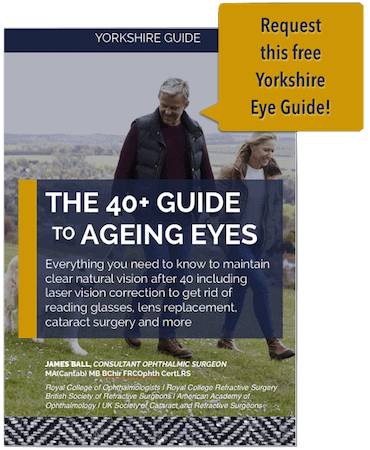Do eye doctors get LASIK?In a word, yes! I used to read and hear from people that they didn’t want to move forward with LASIK laser eye surgery because their ophthalmologist wore glasses or because they were under the impression that no eye surgeons have had LASIK. If this was true in the past, it indeed isn’t now.
We now have some published evidence in the literature to give us an answer to this question along with my own anecdotal experience, which I can share. In 2015, The Journal of Cataract and Refractive Surgery published a survey of ophthalmologists who perform LASIK. They used a 22 question survey to assess the attitudes of ophthalmologists who have performed laser vision correction in the last ten years, to see how many had undergone LASIK themselves, and how many would be willing to recommend it to immediate family members (1).
Do LASIK surgeons have LASIK surgery?
The survey found that 62.5 percent of refractive surgeons with refractive error amenable to treatment have already had laser vision correction, and 95 percent are entirely, or at least mostly, satisfied with their outcomes.
This level of acceptance is around five times the prevalence of refractive surgery in the general population, far surpassing any other profession with the possible exception of the military in the USA. The survey also found that the vast majority (over 90 percent) of the refractive surgeons surveyed have performed or recommended laser vision correction to one or more of their parents, spouses, siblings, and children.
The study achieved an incredibly high response rate for a questionnaire. The researchers approached 250 known refractive surgeons using an online survey and received responses from 249 of 250.
My own experience accords with the findings of this study. For the last three years, I have attended the ZEISS European Ophthalmic Surgeons meeting. It is a beneficial meeting for those of who work with the ZEISS laser vision correction platform comprising the VisuMax femtosecond laser and the MEL 90 excimer laser.
Not only is the meeting a useful opportunity for learning of the latest technological developments from ZEISS but it is also a great forum for interacting with other surgeons who use the ZEISS platform and the genius engineers who develop the technology. Year on year, there has been an increase in the number of surgeons who answer yes to the question “have you had LASIK?”.
What’s driving laser eye surgeons to have laser eye surgery?
One of the drivers for this increase has been the success of PRESBYOND LASIK to address presbyopia symptoms (the need for reading glasses).
This treatment effectively increases the proportion of the population who can benefit from LASIK. The traditional perception of LASIK is that it is a treatment just for younger people to treat their myopia or hyperopia. With PRESBYOND, LASIK can now help older patients who have lost their ability to move focus from distance to near and back out again – a group of people who I am gradually joining.
I’m now 46 and have started to find difficulty with my near vision when reading. I have always enjoyed excellent unaided distance vision and have not need for any form of optical correction. With time, however, I will gradually become an individual who can benefit from PRESBYOND LASIK (probably when I’m fifty). Most of the ophthalmic surgeons at the ZEISS meeting are of a similar vintage to me, and every year more of them have had PRESBYOND LASIK to correct their refractive error and get themselves out of reading glasses.
It is easy to see why there may be particular interest in the choices ophthalmologists make for their optical correction. They are a population who are especially well informed regarding the effectiveness of LASIK and the risks involved in LASIK. They are also a group of people who depend on their vision for their ability to perform surgery – for their career.
Let’s consider the effectiveness of LASIK. It’s been around for over twenty years and has benefitted from continuous evolution. NICE (The National Institute for Clinical Excellence) showed that it is effective with their meta-analysis as has a Cochrane review. Regarding safety, the data from my clinic over the last ten years has shown no patients have lost two or more lines of best spectacle-corrected vision. That accords with studies published on post-millennial LASIK. The risk of infection has recently been shown to be less than in 1 in 20,000 cases.
Several studies demonstrate the effectiveness of PRESBYOND LASIK for providing an effective range of focus from a distance through to near without glasses, and this is the treatment, which has drawn my senior colleagues. It’s been fascinating to talk to them about their treatment and experience from the patient perspective. I’ll be joining them in four or five years time…
- Kezirian, G.M., et al., Prevalence of laser vision correction in ophthalmologists who perform refractive surgery. J Cataract Refract Surg, 2015. 41(9): p. 1826-32.
- Shortt, A.J., B.D. Allan, and J.R. Evans, Laser-assisted in-situ keratomileusis (LASIK) versus photorefractive keratectomy (PRK) for myopia. Cochrane Database Syst Rev, 2013(1): p. CD005135.
- Schallhorn, J.M., et al., Infectious keratitis after laser vision correction: Incidence and risk factors. J Cataract Refract Surg, 2017. 43(4): p. 473-479.
- Reinstein, D.Z., et al., LASIK for presbyopia correction in emmetropic patients using aspheric ablation profiles and a micro-monovision protocol with the Carl Zeiss Meditec MEL 80 and VisuMax. J Refract Surg, 2012. 28(8): p. 531-41.
- Reinstein, D.Z., T.J. Archer, and M. Gobbe, LASIK for Myopic Astigmatism and Presbyopia Using Non-Linear Aspheric Micro-Monovision with the Carl Zeiss Meditec MEL 80 Platform. J Refract Surg, 2011. 27(1): p. 23-37.
REQUEST A CALL BACK


